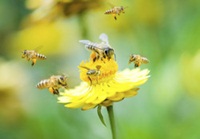
Research just published shows there is a new threat to our wild bee populations.
Not only are Europe’s bees at risk from environmental pollutants and habitat loss, but it now appears their commercial cousins are capable of spreading deadly viruses to the community of wild pollinators.
Known to cause severe colony losses in managed honeybee populations, researchers say rapidly mutating viruses need to be carefully monitored to stop them jumping from one bee species to another.

Writing in the Journal of Applied Ecology, scientists from the University of Exeter in the UK, say there is evidence that many wild pollinators are exposed to viruses from commercial species, resulting in multiple cross-infection.
‘Our study highlights the importance of preventing the release of diseased commercial pollinators into the wild,’ lead researcher Dr Lena Wilfert tells the BBC. The diseases carried by commercial species affect a wide range of wild pollinators but their spread can be avoided by improved monitoring and management practices. ‘Commercial honey beekeepers have a responsibility to protect ecologically and economically important wild pollinator communities from disease’ she explains.
But relying on the commercial keepers to keep their bee populations healthy through management practices might not be enough. Vanessa Amaral-Rogers of the charity, Buglife, argues additional measures are needed to keep wild pollinator populations safe across Europe. She tells the BBC that the results of the study showed an urgent need for changes in how governments regulate the importation of bees.
Commercial bees are used to pollinate crops such as peppers and oilseed rape. ‘Now these studies show how diseases can spill over between managed honey bees and commercial bumble bees, which could have potentially drastic impacts on the rest of our wild pollinators,’ says Amaral-Rogers.
Buglife report that a 2014 study on a sample of commercial bumble bee hives imported into the UK found 77 % were contaminated with up to five different parasites, with a further three being found in the pollen that was brought in with them.
Amaral-Rogers is clear that the impact of spill-over from commercial to wild bees has already been felt, ‘Wild honey bees can no longer be found in England or Wales, thought to have been wiped out by disease.’
According to sciencedaily.com, the global value of insect pollinators has been estimated to be around EUR 153 billion per annum. Commercial pollination services are provided predominantly by honeybees and bumblebees, but wild pollinators play an important role pollinating crops as well as native plants.
Unfortunately, as the website explains, the social behaviour of honeybees, bumblebees and social wasps, provides perfect conditions for disease transmission both within the colony and between different species.
Source: Cordis.eu – Wild Bees Threatened by Virus from Commercial Bees




